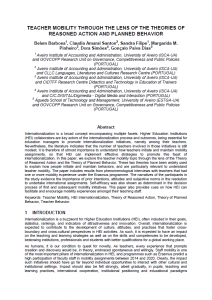 Belem Barbosa, Claudia Amaral Santos, Sandra Filipe, Margarida M. Pinheiro (CIDTFF), Dora Simões & Gonçalo Paiva Dias | in Proceedings of ICERI2017 Conference, pp. 3339-3346
Belem Barbosa, Claudia Amaral Santos, Sandra Filipe, Margarida M. Pinheiro (CIDTFF), Dora Simões & Gonçalo Paiva Dias | in Proceedings of ICERI2017 Conference, pp. 3339-3346
Abstract:
“Internationalization is a buzzword for Higher Education Institutions (HEI), often included in their goals, statistics, rankings, and indicators of attractiveness and innovation. Overall, HEI internationalization is expected to contribute to the development of culture, attitudes, and practices that foster cross-boundary and cross-cultural perspectives in HEI activities [1]. As such, it is expected to have an impact on the teaching and learning strategies as well as on the skills and competencies to be developed, bestowing institutions, professionals and students with better qualifications for a global working place. Internationalization is a broad concept encompassing multiple facets that include student mobility, internationalization at home, teacher mobility, capacity building, curricular relevance and innovation potential, just to name a few. As Sanderson [2] stresses, HEI collaborators are key actors of the internationalization process and outcomes, thus it is essential for education managers to promote internationalization initiatives, namely among their teachers. Regarding teacher mobility, the literature points to the fact that it is still infrequent, as only a small percentage of HEI teachers embrace those initiatives, despite the popularity of programs such as Erasmus. It is therefore of utmost importance to understand how teachers initiate and maintain mobility assignments, so that HEI can implement effective strategies to promote this facet of internationalization.
In this paper we explore the teacher mobility topic through the lens of the Theory of Reasoned Action [3, 4], and the Theory of Planned Behavior [5, 6]. These two theories have been widely used to explain how people initiate and maintain behaviors, and are particularly relevant to understand teacher mobility.
The paper includes results from phenomenological interviews with teachers that had one or more mobility experience under the Erasmus program. The narratives of the participants in the study evidenced the importance of prior intentions, attitudes and subjective norms in the resolution to undertake international assignments. Self-efficacy was also shown as determinant in the decision process of first and subsequent mobility initiatives.
The conclusions of this paper provide cues on how HEI can facilitate and encourage mobility experiences amongst their teaching staff.”
ler paper (versão post-print)




